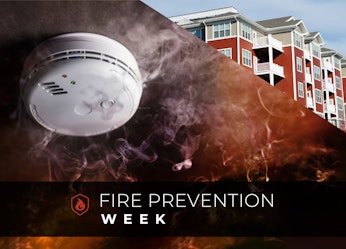

M|O Perspectives
Check back here for our thoughts on the latest developments in our industry.
Fire Prevention Week
Oct 09, 2023
It’s Fire Prevention Week! As AEC consultants, we know that fires are all too common these days. Because fire/life safety issues affect entire complex building systems, our teams are astute at managing the coordination of many moving parts, using concepts from fire protection engineering and fire/life safety science to assure systems work together to provide safe, livable spaces. But regardless of complexity, there are some interesting, universal, simple experiences with safety that everyone can relate to.
The Hamburger Test
You've probably been told that smoke alarms are crucial to giving you an early warning of a fire in your home, or that you should change the batteries every six months. But did you know that new smoke alarm models are required to pass something known as the “hamburger test?"
Officially the "cooking nuisance smoke test," the “hamburger test” was created because research found that nuisance alarms from cooking were a leading cause for occupants to disconnect smoke alarms. Revisions to the test standards used by Underwriters Limited require advance sensing techniques that can more accurately distinguish between the different types of smoke created by smoldering fires and cooking. While the technology is advanced, the test itself is surprisingly simple.
The test consists of cooking frozen hamburger patties with a specific fat content on the broiler of an electric range. To pass the test, smoke alarms must not sound until the smoke reaches a thickness beyond what normal cooking would create. Additional tests of smoke alarms verify that they will sound when subjected to lower levels of smoke during smoldering fires. Since these types of fires are less likely to be detected quickly, they can ultimately grow into more hazardous fires. Smoke detectors, which are similar devices but are installed as part of a fire alarm system (unlike smoke alarms, which are standalone devices) are subject to similar testing. Approved smoke alarm and smoke detector models will be less likely to activate in response to cooking but will still alert occupants to other types of fires that cause damage, injury, and loss of life.
Other factors
Other factors can impact nuisance alarms as well. Contrary to popular perceptions, smoke alarms are not typically intended for installation in kitchens; instead, they should be placed both inside and outside of bedrooms and other select locations. As Marx|Okubo provides consulting services to owners, managers, and investors in residential multifamily buildings, we have a lot of experience consulting when they are having problems with frequent false alarms, tenants who remove smoke alarms and put their property in danger, or any other fire alarm maintenance concerns.
The updates to the testing standards impact residential properties like senior living facilities and apartment buildings. Nuisance alarms in a senior living facility might sound the fire alarm throughout the facility, requiring a disruptive evacuation. In an apartment, nuisance alarms might move tenants to disconnect alarms, which could subsequently delay discovery of a fire and result in more damage (for example, from sprinkler activation) than would have otherwise occurred.
Marx|Okubo's multidisciplinary team of professionals works with building stakeholders to ensure that smoke alarms and other life safety equipment are properly selected, installed, and maintained over the life of the system. Our experience in this area continually shows us how important it is to tailor our solutions to fit the needs of each client and their budget while extending the life of their building systems and preparing them for the future.
Our engineers and building code experts are trained to work closely with architects, building owners, and developers to identify risks, set goals, and employ features designed to control or mitigate fires in both new and existing properties. With building and fire codes around the country becoming increasingly complex, our teams must constantly study the local nuances of fire/life safety and apply this knowledge as appropriate to each project or property. If you have any fire/life safety questions or concerns for your building or portfolio, please contact Steve Schneider, Director of Fire/Life Safety.

What we do.
- Owner's Representation
- Property Condition Assessment
- Project Management
- Constructability Reviews
- Repair | Reconstruction
- Facility Condition Assessment
- Construction Loan Monitoring
- Accessibility
- Building Enclosure
- Fire | Life Safety
- Mechanical | Electrical | Plumbing
- ESG | Sustainability & Resiliency
- Structural Engineering
- ASAP® - Automated Structure Alert Program
Marx|Okubo is a national architecture/engineering/construction consulting firm that works with real estate owners, investors and lenders—at every point of the property lifecycle—to evaluate their building projects, solve complex challenges and implement tailored solutions. We help clients understand their projects’ complexities, so they can make more informed decisions and, ultimately, mitigate their risk.




